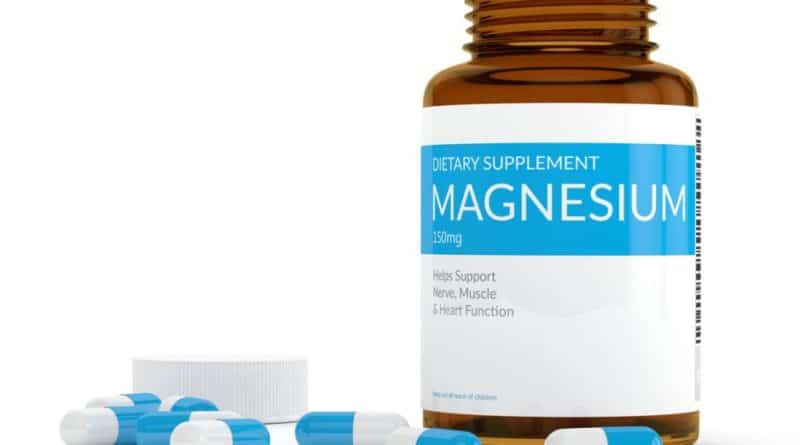The Benefits of Magnesium Supplements
In my experience as a certified sports nutritionist and strength coach, many athletes focus on the big-picture macros like protein and carbs but often overlook the micronutrients that truly unlock peak performance. One of the most critical, yet frequently ignored, minerals is magnesium. While a balanced diet is always the goal, many people—especially active individuals—may need magnesium supplements to function optimally.
Known as the fourth most abundant mineral in your body, magnesium is a powerhouse. It’s a key player in over 300 essential enzymatic reactions, influencing everything from energy production and protein synthesis to nerve function and blood pressure regulation. This isn’t just about general health; for athletes, it’s about recovery, muscle function, and energy itself.
RELATED: Magnesium and Insulin 101 — Blood Sugar Management?
Disclaimer: This article is for informational purposes only. It is not meant to treat or diagnose any condition. The information found within this article is not medical advice and should not supersede a doctor’s diagnosis and treatment plan should you have a health condition. The use of magnesium supplements should never be a replacement for any medication that your doctor puts you on.
Table of contents
- What Foods Are High in Magnesium?
- What Are the Benefits of Magnesium Supplements?
- Do You Have a Magnesium Deficiency?
- What Is the Correct Dosage?
- Possible Side Effects of Magnesium Supplements
- Should You Use Magnesium Supplements?
- When Should You Take Magnesium Supplements?
- If You Need Them, Magnesium Supplements Are Great to Use Daily
- Magnesium Supplements FAQs
Key Takeaways
- Essential for Health: Magnesium is vital for over 300 bodily functions, including energy production, muscle function, and mood regulation.
- Widespread Deficiency: A significant portion of the US population, potentially up to 50-60%, does not get enough magnesium from their diet.
- Targeted Benefits: Magnesium supplements can help lower blood pressure, improve sleep quality by calming the nervous system, boost mood, and support heart health.
- Choose the Right Type: Different forms of magnesium have different benefits. Magnesium Glycinate is excellent for sleep and relaxation, Citrate can help with constipation, and Oxide is less absorbed but common.
- Dosage and Timing Matter: A general dose is 200-400 mg daily, but athletes may need more. The best time to take your supplement depends on your goal; for instance, take it in the evening for better sleep.
What Foods Are High in Magnesium?
Before turning to magnesium supplements, the first step is to focus on your diet. Many whole foods are excellent sources of this vital mineral. The Daily Value (DV) for magnesium is around 420 mg for adults, and you can get a good portion of that through smart food choices.
Here’s a breakdown of some of the best food sources to add to your plate:
| Food Source | Serving Size | Magnesium (mg) | % Daily Value (DV) |
|---|---|---|---|
| Pumpkin Seeds | 1 ounce | 168 mg | 40% |
| Chia Seeds | 1 ounce | 111 mg | 26% |
| Almonds (Dry Roasted) | 1 ounce | 80 mg | 19% |
| Spinach (Boiled) | ½ cup | 78 mg | 19% |
| Cashews (Dry Roasted) | 1 ounce | 74 mg | 18% |
| Black Beans (Cooked) | ½ cup | 60 mg | 14% |
| Dark Chocolate (70-85% cocoa) | 1 ounce | 65 mg | 15% |
| Avocado (Medium) | 1 whole | 58 mg | 14% |
What Are the Benefits of Magnesium Supplements?
When diet isn’t enough, magnesium supplements can be a game-changer. I often recommend them to my clients who are struggling with recovery, sleep, or stress. The key is understanding how they work and what specific benefits you’re aiming for.
1. Reduce Blood Pressure
Many people associate high blood pressure with stress or sodium intake, but mineral deficiencies play a significant role. Magnesium helps relax your blood vessels, which can lead to lower blood pressure. For those with hypertension, this effect can be particularly beneficial.
A 2024 umbrella meta-analysis confirmed that magnesium supplementation significantly reduces both systolic and diastolic blood pressure. The analysis found that doses of 400 mg or more per day showed an even more pronounced effect, especially when taken for at least 12 weeks.
So if you have high blood pressure, consuming this supplement could be beneficial, but always talk to your doctor first.

2. Improve Sleep Cycle
Magnesium plays a critical role in calming the nervous system and preparing your body for rest. It helps regulate neurotransmitters, like GABA, that promote sleep. For anyone struggling with sleep, especially athletes whose nervous systems are constantly fired up, this is a major benefit.
A 2024 randomized controlled trial found that Magnesium L-threonate, a form known for its high brain bioavailability, significantly improved deep sleep and REM sleep scores compared to a placebo. Another study from July 2024 showed that supplementation led to better sleep duration and efficiency.
Pro-Tip: For sleep support, I recommend taking Magnesium Glycinate. It’s highly absorbable and gentle on the stomach, making it ideal for evening use. Brands like Thorne or Pure Encapsulations are highly regarded for their quality and purity.
3. Boost Mood
If you’re feeling anxious or down, low magnesium levels could be a contributing factor. This mineral plays a part in mood regulation and the body’s stress-response system. Some research suggests it can have a calming effect and help reduce symptoms of anxiety and depression.
One study found that supplementing with 500 mg of magnesium per day helped alleviate symptoms of depression and anxiety. While more research is needed, the link between magnesium and mood is promising. Consistency is key, as the benefits are tied to long-term use.
4. Reduce the Risk of Heart Diseases
Low magnesium levels are linked to an increased risk of heart disease. This is because the mineral is crucial for maintaining a healthy heart rhythm and regulating factors like blood sugar and blood pressure, which can impact cardiovascular health.
Studies show that people with higher magnesium intake have a lower risk of developing heart disease. Supplementation can help reduce several risk factors, including high blood pressure and arterial stiffness, supporting overall cardiovascular function.
Do You Have a Magnesium Deficiency?
It’s surprisingly common to be deficient in magnesium, even with a healthy diet. Estimates suggest that up to 50-60% of Americans don’t get the recommended daily amount. For athletes, the risk is even higher, as strenuous exercise can increase magnesium loss through sweat and urine by 10-20%.
Early signs of magnesium deficiency are often subtle and can include:
- Fatigue and low energy
- Muscle cramps or twitching
- Loss of appetite
- Nausea
- Slower recovery times after workouts
More serious symptoms can develop over time, like numbness, abnormal heart rhythms, and decreased immune function. Factors like alcohol use, certain medications, and kidney issues can also contribute to a deficiency.
What Is the Correct Dosage?
The right dose of magnesium depends on your age, sex, and activity level. For most adults, the recommended daily dose from supplements is between 200-400 mg. The Food and Nutrition Board in the USA sets the tolerable upper intake level for magnesium supplements at 350 mg per day for anyone over 9 years old, not including what you get from food.
Here are the general guidelines for the upper limits from supplements:
- 1-3 years old: 65 mg
- 4-8 years old: 110 mg
- 9+ years old: 350 mg
As I mentioned, athletes often need more, sometimes up to 400-500 mg daily, to account for losses during exercise. If you suspect a deficiency, it’s best to consult a doctor who can provide a personalized recommendation.
Possible Side Effects of Magnesium Supplements
Magnesium supplements are generally safe when taken at the recommended dose. However, exceeding this can lead to some unwanted side effects, especially digestive issues. The most common side effects are nausea, diarrhea, and stomach cramping.
An important tip I give my clients is to choose the right form of magnesium. Magnesium Oxide, while common, has low bioavailability (only about 4% is absorbed) and is the most likely to cause digestive upset. In contrast, Magnesium Glycinate is much gentler on the stomach and better absorbed.
Additionally, magnesium supplements can interact with certain medications, including some antibiotics, diuretics, and proton pump inhibitors. Specifically, they can reduce the absorption of bisphosphonates (for osteoporosis) and tetracycline or quinolone antibiotics. If you have a medical condition, especially kidney problems, or are on any medication, it is critical to talk with your doctor before starting magnesium supplements.
Should You Use Magnesium Supplements?
If your diet is low in magnesium-rich foods or if you are an athlete with higher needs, taking magnesium supplements is a smart move. They are an effective way to fill nutritional gaps and support your overall health and performance.
If you’re experiencing symptoms of deficiency like fatigue or muscle cramps, a supplement could make a noticeable difference. However, it’s always best to consult with a healthcare professional to confirm a deficiency and get guidance on the right form and dosage for your needs.
When Should You Take Magnesium Supplements?
While consistency is the most important factor, the best time to take magnesium can depend on your primary goal.
- For Better Sleep: Take your supplement 1-2 hours before bed. The calming effects can help you relax and improve sleep quality. Magnesium Glycinate is the best choice here.
- For Muscle Recovery: Taking magnesium post-workout can aid in muscle relaxation and recovery.
- For Digestive Health: If you’re using a form like Magnesium Citrate for constipation, taking it in the evening often helps promote a bowel movement the next morning.
- For General Health: You can take it any time of day that is convenient for you. Some people prefer the morning to support energy levels throughout the day.
If You Need Them, Magnesium Supplements Are Great to Use Daily
Think of vitamins and minerals as the high-performance oil and fuel that keep your body’s engine running smoothly. To function at your best, you need an adequate supply of every essential nutrient. Magnesium is a non-negotiable part of that equation.
RELATED: Magnesium Glycinate vs Magnesium Citrate — Which Is Best?
You can find quality magnesium supplements in health food stores and online. Just remember to consult with a medical professional before adding any new supplement to your routine to ensure it’s the right choice for you.
Magnesium Supplements FAQs
What is the best type of magnesium supplement to take?
The best type depends on your needs. Magnesium Glycinate is highly absorbable and great for sleep and anxiety because it’s gentle on the stomach. Magnesium Citrate is also well-absorbed and effective for constipation. Magnesium L-Threonate is often recommended for brain health and cognitive function. It’s generally best to avoid Magnesium Oxide for supplementation due to its poor absorption and laxative effects.
Can I get enough magnesium from food alone?
While it’s possible, many people fall short. Modern farming practices have depleted magnesium levels in the soil, which means our food contains less than it used to. Paired with diets high in processed foods, it’s easy to become deficient. A food-first approach is ideal, but supplements are a reliable way to ensure you meet your needs.
How long does it take for magnesium supplements to work?
You might feel some effects, like improved sleep or muscle relaxation, within a few days to a week of consistent use. However, for correcting a deficiency and seeing benefits for things like mood or blood pressure, it can take several weeks to months of steady supplementation.
Can I take magnesium with other vitamins?
Yes, and in some cases, it’s beneficial. Magnesium is essential for the activation of Vitamin D, so taking them together can be synergistic. However, taking very high doses of zinc (over 142 mg/day) can interfere with magnesium absorption. It’s also a good idea to take magnesium and calcium supplements at different times of the day, as they can compete for absorption when taken together in high doses.


*Disclosure: This article may contain affiliate links or ads, which means we earn a small commission at no extra cost to you if you make a purchase through these links. These commissions help support the operation and maintenance of our website, allowing us to continue producing free valuable content. Your support is genuinely appreciated, whether you choose to use our links or not. Thank you for being a part of our community and enjoying our content.
PLEASE CONSIDER SHARING THIS ON YOUR SOCIAL MEDIA TO HELP OTHERS LEARN MORE ABOUT THIS TOPIC.






